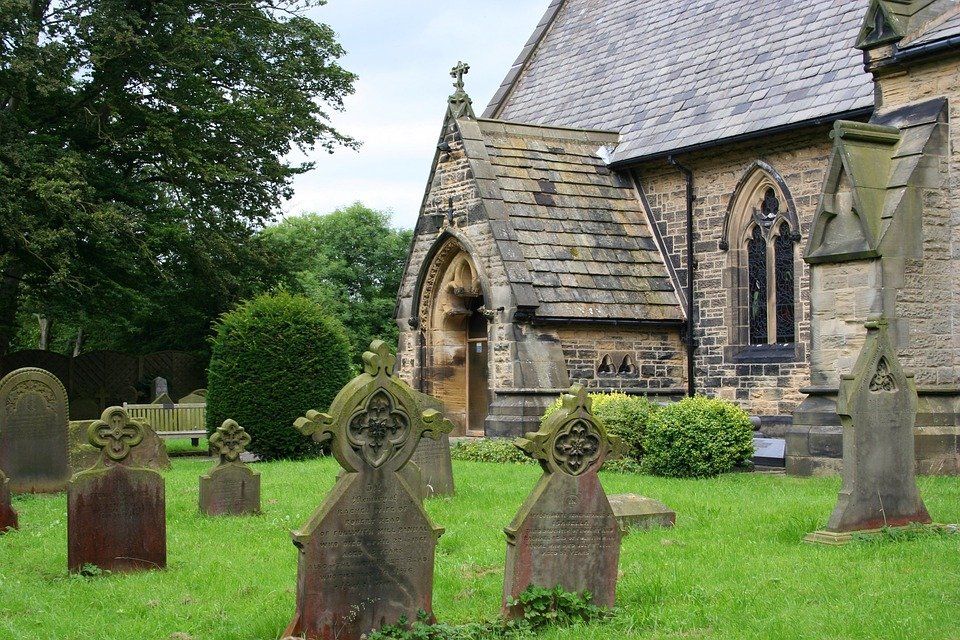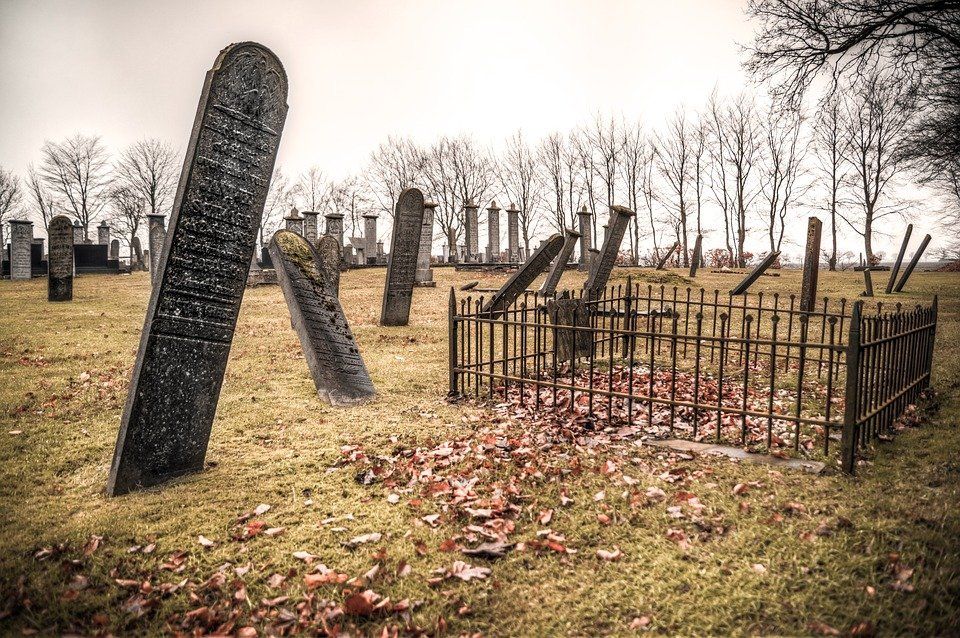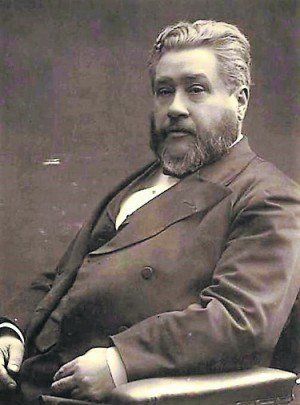
Someone once described death as ‘the last thing we talk about’. With life expectancy longer than ever before, people tend to think of death as something remote, an event so distant that it is not even worth a thought. The Lord Jesus obviously thought otherwise. His teaching is recorded in Luke 16: 19-31. Here, introducing us to two men-a rich man, and one called Lazarus-our Lord describes their separate deaths and, in doing so, draws aside the veil which normally conceals what lies beyond in the eternal world. Some people assume this incident to be a parable but there is good reason to suggest the events actually describe real events. For one thing, the usual introductory words, ‘And he spake a parable unto them saying…’, are absent and if a parable is to be understood as ‘an earthly story with a heavenly meaning’, this passage fails to qualify as it is not an earthly story. Its subject is another world and eternal realities.
Note there is really nothing figurative or symbolic about the characters. Unlike the imaginary persons of the parables, the rich men and Lazarus do not represent others. Also names are given to two of the characters, ‘Lazarus’ and ‘Abraham’. This is never the case in parables; and suggests that this is not parable but history. If the passage is interpreted as a parable, an arbitrary distinction has to be made between the two main figurative characters and the real persons of Moses and the prophets mentioned at the end (v.31). This will inevitably lead to inconsistency of interpretation.
It appears our Lord is describing events which had actually taken place in the unseen world. This makes the Lord’s words even more solemn.
Several important doctrines are taught in this passage.
- All men are subject to physical death. Christ tells us that both the beggar (Lazarus) and the rich man ‘died’ (v. 22). Death is the divinely ordained penalty for sin (Genesis 2: 17; 3: 19; Romans 5:12) and since all are guilty of both original and actual sin, all must face up to the fact that they will die (1 Corinthians 15:22; James 1:14-15). ‘To every thing there is a season … a time to be born, and a time to die’ (Ecclesiastes 3:1 -2).
- After death the soul continues to exist. Although he ‘died’, we are told that ‘the beggar … was carried by the angels into the bosom of Abraham’. Similarly, the rich man ‘died’ end yet lived on in all the distinctiveness of his personality (v. 22). When physical death occurs, there is a separation of soul from body (James 2:26) and the soul ‘departs’ to another realm-the world of spirits (Genesis 35:18; 1 Kings 17:21-22; 2 Timothy 4:6). As Solomon says, ‘Then shall the dust return to the earth as it was: and the spirit shall return unto God who gave it’ (Ecclesiastes 12:7).
- The soul immediately enters one of two places. In this passage we are taught that in the world of the dead there are two (only) widely separated places. Purgatory is a figment in the minds of deluded Roman Catholics. It simply does not exist. Lazarus, we read, was taken to ‘Abraham’s bosom’, an expression common among the Jews to denote ‘paradise’, while the rich man, to his very great distress, found himself in ‘hell’ (w. 2223). We should recall here our Lord’s gracious words to the dying thief, ‘Today shalt thou be with me in paradise’ (Luke 23:43) and also the words written of Judas, who betrayed the Lord Jesus, ‘Judas by transgression fell, that he might go to his own place’ (Acts 1:25).
- Faith is what makes the eternal difference. Lazarus is represented as a believer. His name means ‘God is my help’, and strongly suggests that his trust was placed in the Lord his God. When he died, we are told that he was ‘earned by the angels’ who according to Scripture, are ‘sent forth to minister for them who shall be heirs of salvation’ (Hebrews 1:14), which leads us to believe that Lazarus was among the ‘chosen’ who, although ‘poor in this world’, are ‘rich in faith and heirs of the kingdom’ (James 2:5). Furthermore, he was carried into ‘Abraham’s bosom’ and since Abraham is represented to us as ‘father of all them that believe’, we may conclude that Lazarus, like Zacchaeus, was a true ‘son of Abraham’ (Romans4: 11; cf. Luke 19:9; Galatians 3:7).
- The disembodied soul assumes a definite form. In paradise, Lazarus was capable of being ‘seen’ and note the reference here to ‘the tip of his finger’. As for the rich man, he lifted up ‘his eyes’ and complained bitterly of his burning ‘tongue’ (vv. 23-24). This is at variance with the view commonly held today that souls in the Intermediate State (between death and resurrection) are mere shadows or shades. Scripture plainly teaches otherwise. God himself is ‘spirit’, yet he can ‘manifest’ himself. The angels are ‘ministering spirits’ but this does not mean that they cannot visibly ‘appear’. Why should it be thought strange if disembodied spirits are granted some outer form? Long after his death and burial, Moses ‘appeared’ to the disciples on Mount Hermon (Matthew 17:3. See also: Revelation 6:9; 20:4; cf. Luke 24:37).
- There is continuing state of consciousness, with full sensation. When Lazarus entered paradise, he experienced the joy of fellowship with ‘Abraham’. Moreover, the Bible says he was ‘comforted’ (w. 22, 25). Even more is said about the rich man. In the awful solitude of hell, he was subjected to various ‘torments’ (vv. 23-24). He evidently retained the use of all his faculties, for he had hope of ‘mercy’ and, when that was denied him, he was told to ‘remember’ how in his ‘lifetime’ he received ‘good things’ (w. 24-25). He was even able to communicate with others (vv. 24-25, 29-30). It is only the body which is said to ‘sleep’ until the day of ‘resurrection’ (Matthew 27:52-53; John 11:11-14; Acts 13:36): the soul remains active and conscious, experiencing the happiness or misery of toe other world (Isaiah 14:9-10; 57:1-2). The apostle confirms that even ‘out of the body’ it is possible to be aware of where you are (for example, in ‘the third heaven’), to see ‘visions’ or ‘sights’, and to hear ‘unspeakable words’ (2 Corinthians 12:1-4).
- Somehow it is possible to know the state of other souls. Here, the rich man was able to see, albeit from afar, both ‘Abraham’ and ‘Lazarus’ (v. 23); and Abraham (along, no doubt, with Lazarus) seems to be fully aware of the rich man’s ‘torment’ (v. 25). ‘We know not’, as Jonathan Edwards once remarked, ‘how far the two worlds, the world of happiness and the world of misery, may be within each other’s view’, but it does seem, as Edwards goes on to say. that their inhabitants have ‘a view of each other’s state’. This is borne out by the plain sense of a number of Scriptures, including Luke 13:28: ‘There shall be weeping and gnashing of teeth, when ye shall see Abraham, and Isaac, and Jacob, and all the prophets, in the kingdom of God, and you yourselves thrust out.’

The soul’s state after death is fixed and can never be changed. The rich man hoped that it might somehow prove otherwise, but he was told: ‘Between us and you there is a great gulf fixed: so that they which would pass from hence to you cannot; neither can they pass to us, that would come from thence’ (v. 26). Many entertain the hope that if they die in an unconverted state they will have opportunity to hear the gospel and to believe in the Lord Jesus Christ. Destitute of scriptural support, such a hope will be dashed in pieces within seconds of dying. There is no second chance.
Sinners would be well advised to believe this, for few things are made clearer in the Word of God.
- The day of salvation is said to be now, not later: ‘Behold, now is the accepted time [i.e. the time of favourable acceptance]; behold, now is the day of salvation’ (2 Corinthians 6:2; cf. Hebrews 3:7-8).
- Only in this life is there hope of being saved. Solomon wrote near the end of his life: ‘For to him that is joined to all the living there is hope’ (Ecclesiastes 9:4).
- The gospel is not preached in the next world. We have that from the lips of Christ. He said that it was only for ‘a little while’ that people had access to ‘the light’ (Christ and his illuminating Word). ‘Walk’, he said, ‘while ye have the light [turn to me for your soul’s safety while you can] lest darkness come upon you’ (lest the calamity of death overtake you). He solemnly repeated this in order to make a deep and lasting impression upon his hearers: ‘While ye have light, believe in the light’ John 12:35-36).
- There is no saving ministry of the Spirit there either. God once declared: ‘My spirit shall not always [literally, ‘Yor ever”] strive with man, for that he also is flesh [sinful flesh, destined to die]; yet his days shall bean hundred and twenty years [the average age of men at that time]’ (Genesis 6:4). Now even if terms of mercy were offered, there could be no saving response without the Holy Spirit’s convicting and converting work: and we have it on divine authority that this work ceases with death.
- To die in impenitence and unbelief is to be eternally lost. Christ told the Pharisees twice that if they did not believe in him they would die in their sins (John 8:21,24). To die like that is the supreme disaster. It is to perish under one’ s sin, without any possibility of going to heaven. Our Lord added, ‘whither I go, ye cannot come’. This is no more than what we read in the book of Proverbs. ‘He, that being often reproved hardeneth his neck, shall suddenly be destroyed, and that without remedy’ (Proverbs 29:1).
- After death the next event is not a further opportunity but divine judgement. ‘It is appointed unto men once to die, but after this the judgement’ (Hebrews 9:27). The unbelieving dead are kept in hell’s prison until summoned to the final assize. Then they are brought forth as condemned criminals to be punished for sins of heart and life e. ‘The Lord knoweth how … to reserve the unjust unto the day of judgement to be punished’ (2 Peter 2 9).
- On that great and dreadful day, men and women will be judged, not according to what was done ‘out of the body’ (after death), but according to what was done ‘in his body’ (in this life) (2 Corinthians 5:10). This proves beyond all doubt that only in the ‘here and now’ can we do anything about our soul’s salvation.
All this exposes the madness of the greater part of mankind who, careless of the well-being of their immortal souls, delay the matter of their salvation and run the risk of everlasting torment. According to the gospel, men can today avoid condemnation and pass from death to life. Tomorrow, they may find themselves on the other side of an awful gulf.


















